2011 年 9 月公共英语四级考试真题及答案
21
23
22
of participation.
27
. The first, surge and decline theory, comes
from other media forms is largely
24
26 the "black-box" linking the Internet and political participation by
25 This research is an attempt
Section I Listening Comprehension (30 minutes) 听力 1-20 略
Section II Use of English (15 minutes) 英语常识
根据下列材料,回答 1-20 问题。
In the past decade, new scientific developments in communications have changed the
way many people gather information about politics. The most important of these
new
is the Internet. Recent research suggests the use of the Internet
for political information increases the
While a (n)
relationship between Internet news and political
participation has been found, a theoretical link as to why the Internet
is
to
building on two theoretical
out of political science and the second, media systems dependency
theory,
costs and benefits of political participation. The media can
by providing sufficient information to make
Previous research
side of the equation. One of the media's greatest
public
need.
from a multitude of sources, one would expect it to
through lowering the cost of information.
Besides lowering participation costs, the media can
benefits of participation. Intense media
can
The Internet may encourage a unique participation benefit
mobilization efforts.
the "costs"
decisions about voting.
that the Internet benefits the public through the cost
is information and the
of an event such as an election
excitement that increases the perceived "benefit" of participating.
from communications. Both explanations focus on individual
on media to provide them with the in-formation they
the Internet is capable of providing information
37
increase the
36
political action
30
32
40
increased
28
33
34
39
29
35
, and
31
38
21、A.technologies
B.materials
C.concepts
D.devices
22、
A.practicability
B.feasibility
C.probability
D.stability
23、
A.critical
�
B.analytical
C.empirical
D.technical
24、
A.specific
B.unique
C.particular
D.peculiar
25、
A.built
B.losing
C.missing
D.connected
26、
A.unpack
B.unroll
C.untie
D.unfold
27、
A.experiments
B.comments
C.approaches
D.investigations
28、
A.orientates
B.initiates
C.correlates
D.originates
29、
A.alter
B.decrease
C.induce
D.cover
30、
A.informed
B.accepted
�
C.understood
D.diversified
31、
A.declares
B.denies
C.promises
D.argues
32、
A.databanks
B.resources
C.sources
D.costs
33、
A.base
B.act
C.rely
D.live
34、
A.Because
B.While
C.If
D.Although
35、
A.casually
B.objectively
C.readily
D.skillfully
36、
A.advertise
B.popularize
C.manage
D.encourage
�
37、
A.also
B.yet
C.only
D.just
38、
A.interference
B.statement
C.coverage
D.image
39、
A.generate
B.promote
C.install
D.expose
40、
A.for
B.via
C.at
D.from
Section III Reading Comprehension (60 minutes) 阅读理解 A
Text 1
Paul Johnson's A History Of The American People is what we have come to expect from
this productive writer--clear, colorful narrative, vivid character sketches,
marvelous research, sweeping, confident statements, and an insistent conservative
viewpoint which tempts him into serious omissions.He will not conceal his opinions,
he tells us.Good.Then we can judge his history free of pretences to objectivity--his
or ours.
Almost at start, we notice something interesting: Johnson passes quickly over a
defining moment in American history--the Columbus story--important because it is
the first lesson every American schoolchild learns.How you treat that story--what
you choose to tell of it--signals your view of the longer American experience,
reaching to our time.
In school textbooks, Columbus has always been presented as a hero.Only recently
has a new set of facts--always available but ignored--begun to get into public
attention: that Columbus, on landing, and desperate for gold, encountered native
Americans who were peaceful and generous ( by his own admission) and tortured them,
�
kidnapped them, enslaved them, murdered them.John-son, who goes into much detail
about other matters (like Ronald Reagan's jokes) is silent on this.Among his
numerous references there is none to Bartolome de las Casas, an eyewitness, who
de-scribed in detail the horrifying evils committed by Columbus and his fellowmen
against the Indians, which resulted in the native population of Hispaniola being
wiped out--genocide is an appropriate term--by the year 1550.
I suggest this is not an innocent omission.Johnson wants us to look positively on
the history of the United States.Yes, he says, there were "severe wrongs" committed
in "the dispossession of a native people" and in the institution of slavery.But
has the U.S., he asks at the start of his book, "made up for its organic sins"?
His whole book suggests that it has, and that in doing so it has be-come (he says
at the end) "a human achievement without parallel...the first, best hope for the
hu-man race".
Since Johnson has decided that the U.S.is "the first, best hope for the human race",
he has shaped its history accordingly.If we prefer to see that history as a complex
and unfinished struggle of Americans for justice, against militarism, for economic,
racial and sexual equality, we are badly served by a flattering admiration of those
in power, pretending to be a history of "the people".
41、The first paragraph shows that the author's opinion of the book A History Of
The American People is
A.critical.
B.objective.
C.defensive.
D.admiring.
42、The way people have been treating Columbus story indicates their view of
A.the American school education.
B.great heroes in American history.
C.the development of American history.
D.the American society at present.
43、The book makes no reference to Bartolome de las Casas probably because Paul
Johnson
A.is a writer fond of omissions.
B.isn't tempted to make references.
C.bears an inborn hatred for horrifying evils.
D.doesn't want to see the image of the U.S.stained.
44、The word "genocide" ( Line 8, Paragraph 3) most probably means
A.killing of people of a particular race.
B.driving-out of native inhabitants.
�
C.extinction of a whole generation.
D.assimilation of ethnic groups.
45、The author would agree with the statement that the U.S.
A.has compensated the natives for their earlier sufferings.
B.has never committed serious evils to the natives in history.
C.has not undone the wrongs committed in history.
D.has become the best hope for the human race.
Text 2
In the 21 st century there's no doubt that frightening new infectious diseases will
appear.Today new viruses are coming out of nature and "discovering" the human
species.Just since 1994, at least 30 new viruses have appeared.
Viruses are moving into the human species because there are more of us all the
time.From a virus' point of view, we look like a free lunch that's getting bigger.In
nature viral diseases tend to break out when populations increase rapidly and become
densely packed.Then many deaths occur and the population drops.This is nature's
population-control mechanism.There is no reason to think the human race is free
from the laws of nature.
Giving these laws an extra push will be the rise of megacities--huge densely packed
cities in less developed nations.A United Nations study predicts that by the year
2015, there will be 26 ex-tremely big cities on the planet.By then, some megacities
could have 30 million or more people.That is approximately the total population
of California.Imagine all the people in California crowded together tightly into
one vast city.Then remove most doctors and medical care, take away basic sanitation
and hygiene, and you have a biological "time bomb".Now make eight or ten such "bombs"
and plant them around the world.
Also consider the biological weapons the world will be capable of producing in the
future.The 20th century saw the creation of great and terrible weapons based on
the principles of nuclear physics.The 21st century will see great and terrible
weapons based on the knowledge of DNA and the genetic code.As biotechnology becomes
more sophisticated and powerful, biologists will learn how to mix genes of different
microbes to create unnatural strains that can be turned into deadly, effective
weapons.
Biological weapons are a disgrace to biology.Most biologists haven't wanted to talk
or even think about them.The physicists lost their innocence when the first nuclear
bomb went off in 1945.The biologists will lose their innocence when the first
biological weapon spreads through the human species.
Yet the 20th century survived despite the existence of the nuclear bomb.There was
great economic and scientific progress and much human happiness.The same can be
true in the next century.We may not completely win the 21st century microbe war,
but I am confident that we won't lose it.
46、Infectious diseases are more likely to occur where
�
A.different human races are mixed in living.
B.many people live in crowded communities.
C.population drops due to nature's control mechanism.
D.new viruses appear for the first time.
47、It can be seen from the text that the author views extremely large cities as
a(n)
A.possible control mechanism of the nature.
B.terrible burden in terms of public sanitation and hygiene.
C.potential biological threat to human health.
D.inevitable outcome of the law of nature.
48、The author implies in the text that
A.weapons now fall into quite different categories.
B.biological war may break out any time.
C.most scientists are against nuclear weapons.
D.science is liable to be used to create great evils.
49、As to the solution of the problems in the future, the author appears to be
A.somewhat doubtful.
B.much skeptical.
C.moderately optimistic.
D.extremely desperate.
50、What does the text mainly discuss?
A.Threats from the new microbes in the next century.
B.How new viruses affect the human society.
C.What megacities may bring to human species.
D.The disastrous effect of nuclear and biological weapons.
Text 3
Given the fact that each person is only one of approximately 90 million voters in
this country, does it make sense to believe that one person's participation, one
vote, will have any impact on a major election? Simply to raise the question "What
if everyone felt the same way?" does not re-move the lingering impression that a
single person is made to feel insignificant by the enormous number of people who
do go to the polls, especially in a national election.
Supporters of the ruling elite theory insist that even though voters are given a
choice among candidates, their choice is restricted to a narrow range of
similar-minded individuals approved by the ruling elite.Elections do not express
what most people want or need, nor do they provide guidance for politicians (even
�
if they want it) on what policies to enact.In this view, elections are primarily
just rituals that perform a symbolic function for society.
Still, since most people continue to show faces at the polls at one time or another,
what argu-ments can be made in favor of voting? One argument is that voting does
have significance, if not in individual impact, then in group pressure.Because
citizens collectively have the power to give or withhold votes, they directly
control the term in office of elected officials.Even if the choice is between
Tweedledee and Tweedledum, Tweedledee knows that one must be accountable and this
is fixed by law, and that minimally he or she must strive to avoid displeasing the
constituents to lose the job.
But perhaps political effectiveness and impact in voting are not the only
consideration anyway.People do not vote only to influence policy.Millions go to
the effort to register and vote for a variety of other reasons as well.Some people
may participate just to avoid feeling guilty about not voting.They may have been
taught that is their patriotic duty to vote and that they have no right to complain
about the outcome if they stay at home.Still others may vote to derive satisfaction
from feeling that they are somehow participants, not just spectators, in an exciting
electoral contest.
Even if their one vote may not be crucial to the outcome, it nevertheless affirms
their role in and support for the political process.Indeed, perhaps it is this final
need that fuels the desire for full democratic participation among people in many
nations of the world.
51、What is the true nature of elections according to the ruling elite theory?
A.They are routine practices in a modern society.
B.They are political gathering for a small number of people.
C.They are deceptive schemes manipulated by the ruling party.
D.They are chances for those who want to utter their wishes.
52、According to Paragraph 3, people go to the polls because they
A.believe it's their responsibility to vote.
B.believe their collective power makes a difference.
C.want to show the strength and impact of each individual.
D.don't want to risk losing their jobs.
53、"Tweedledee and Tweedledum" (Line 5, Paragraph 3 ) is used to refer to
A.two voting individuals in an election.
B.whatever parties in office.
C.whichever candidates in an election.
D.supporters in different constituencies.
54、What can be learnt from the last two paragraphs?
�
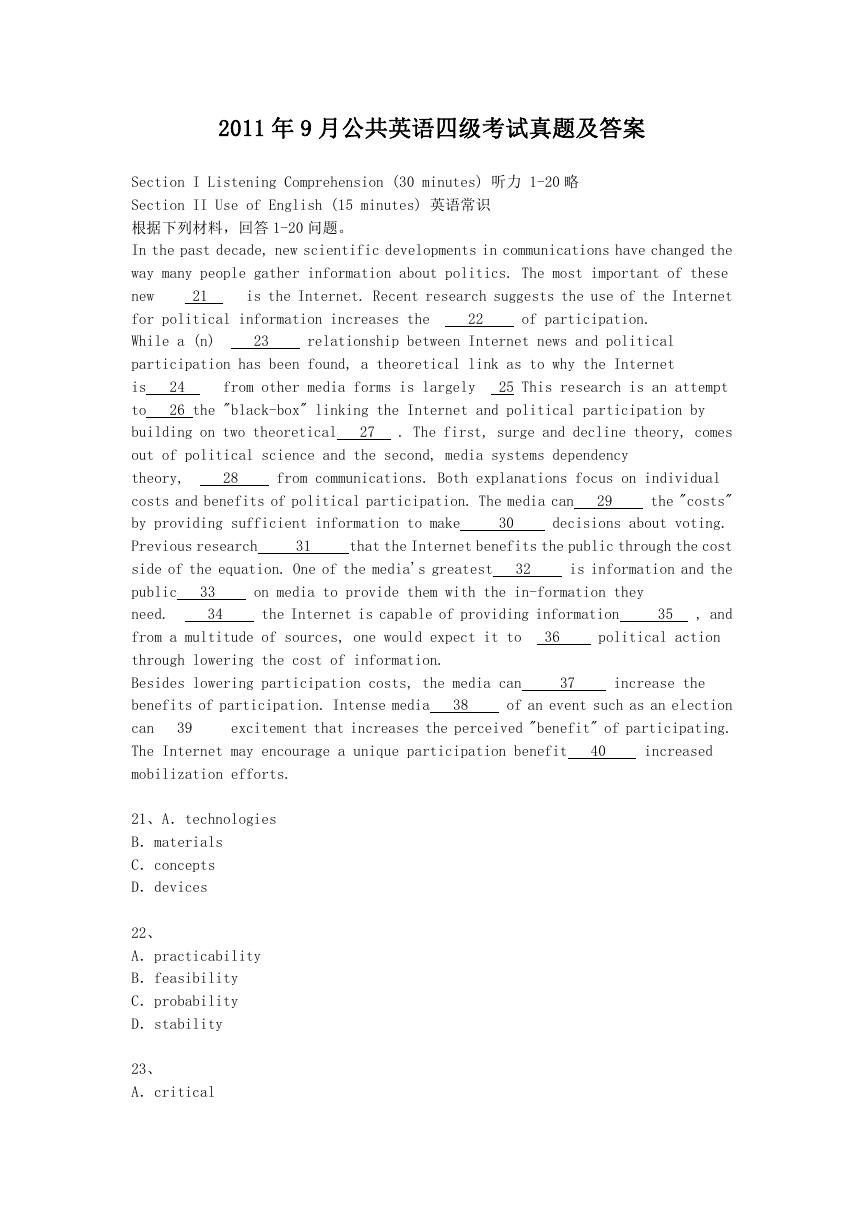
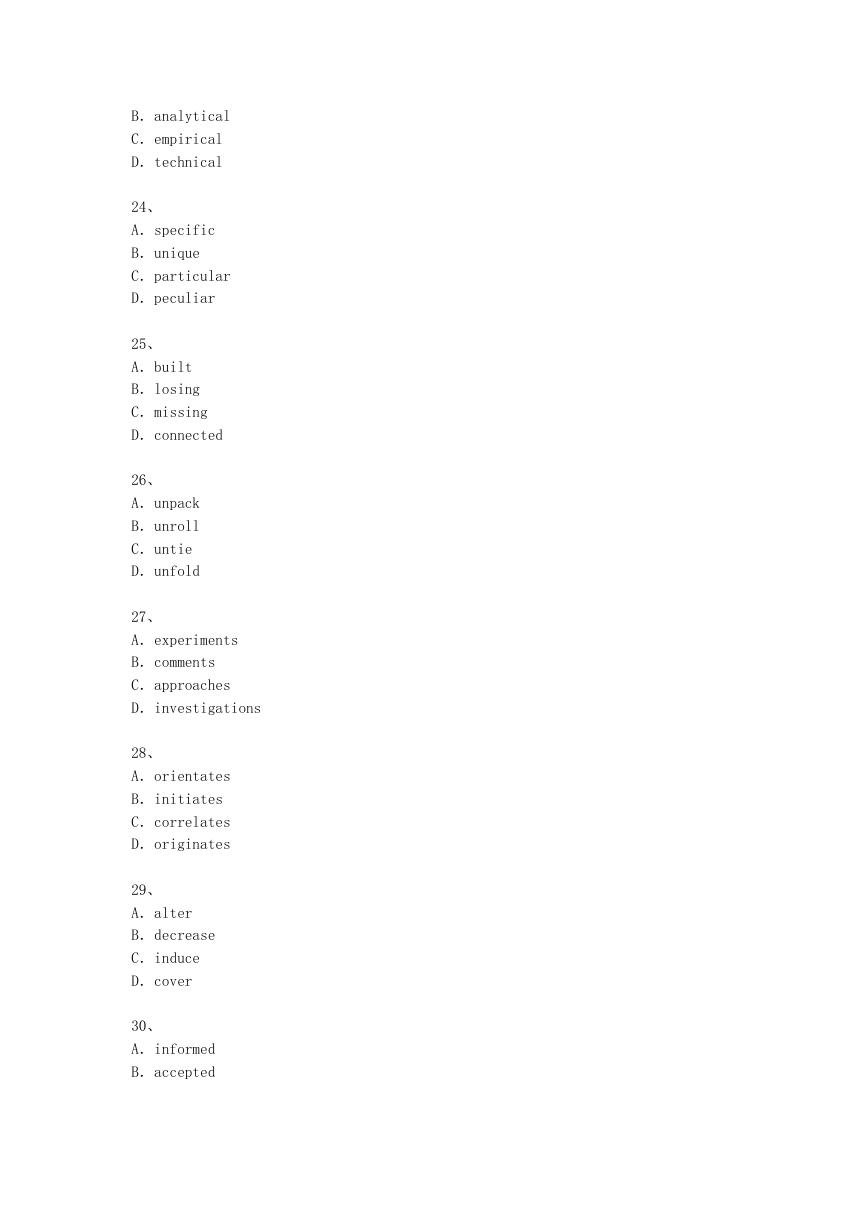
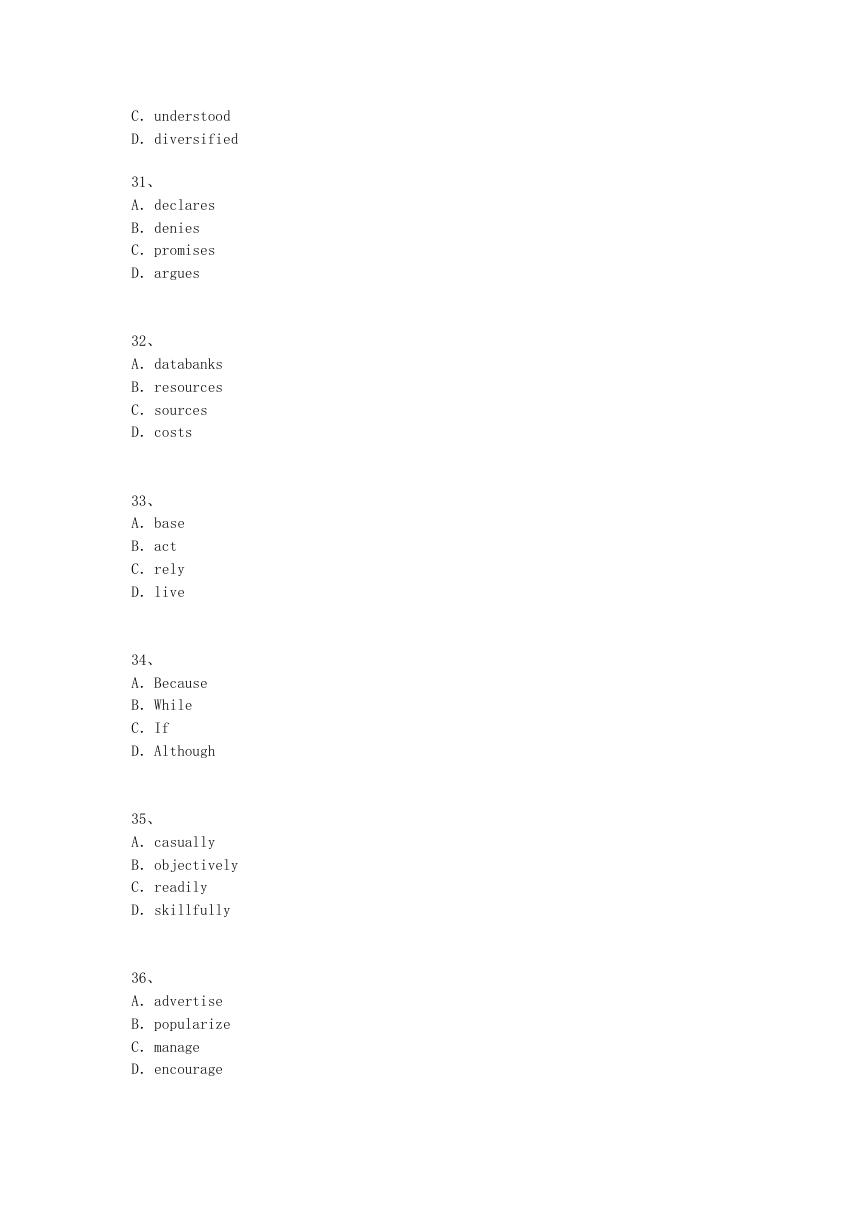
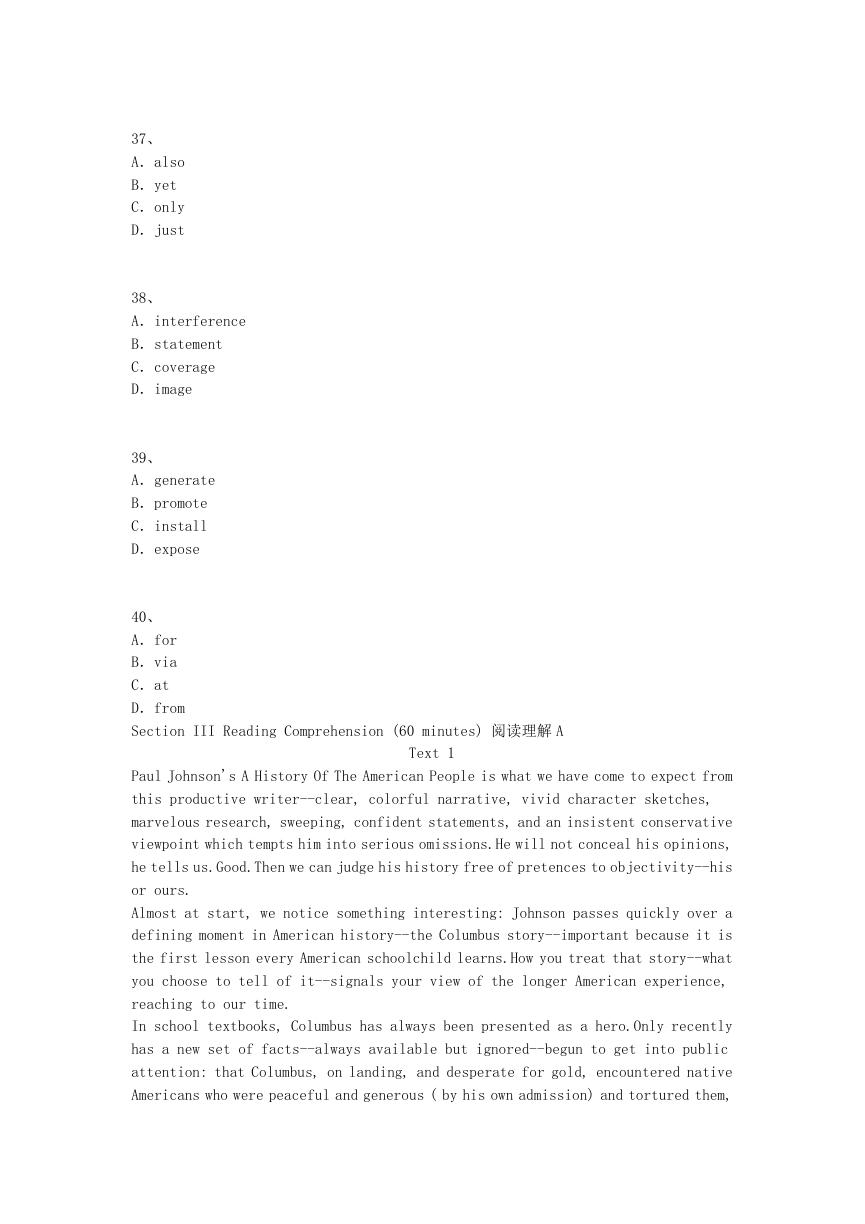
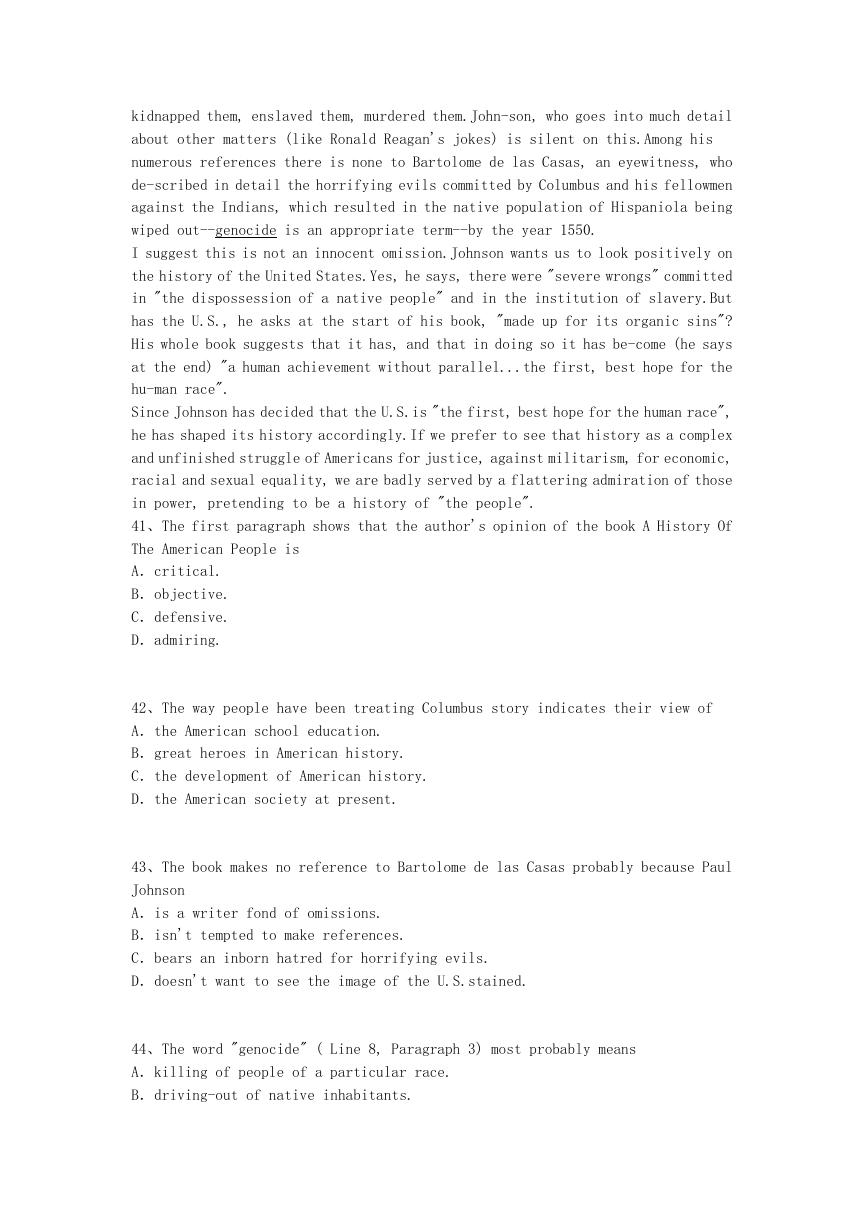

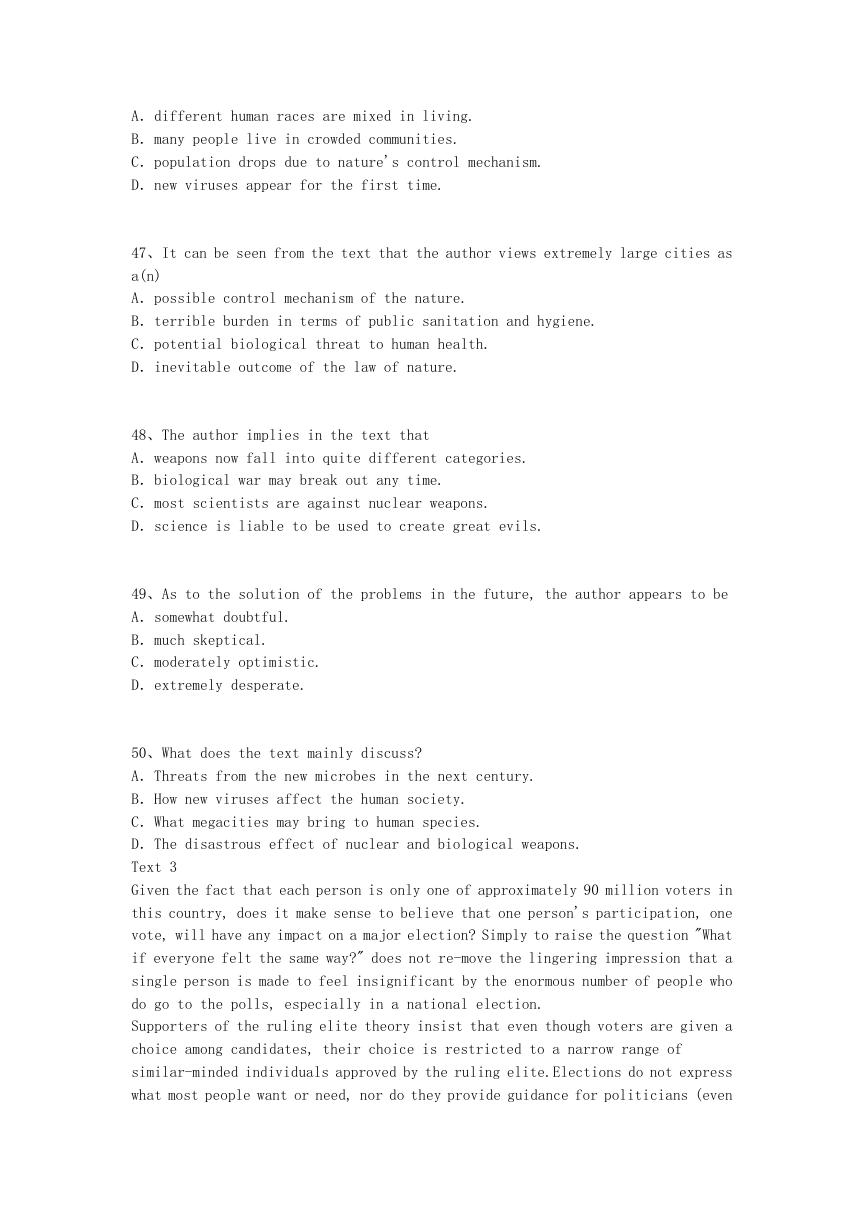
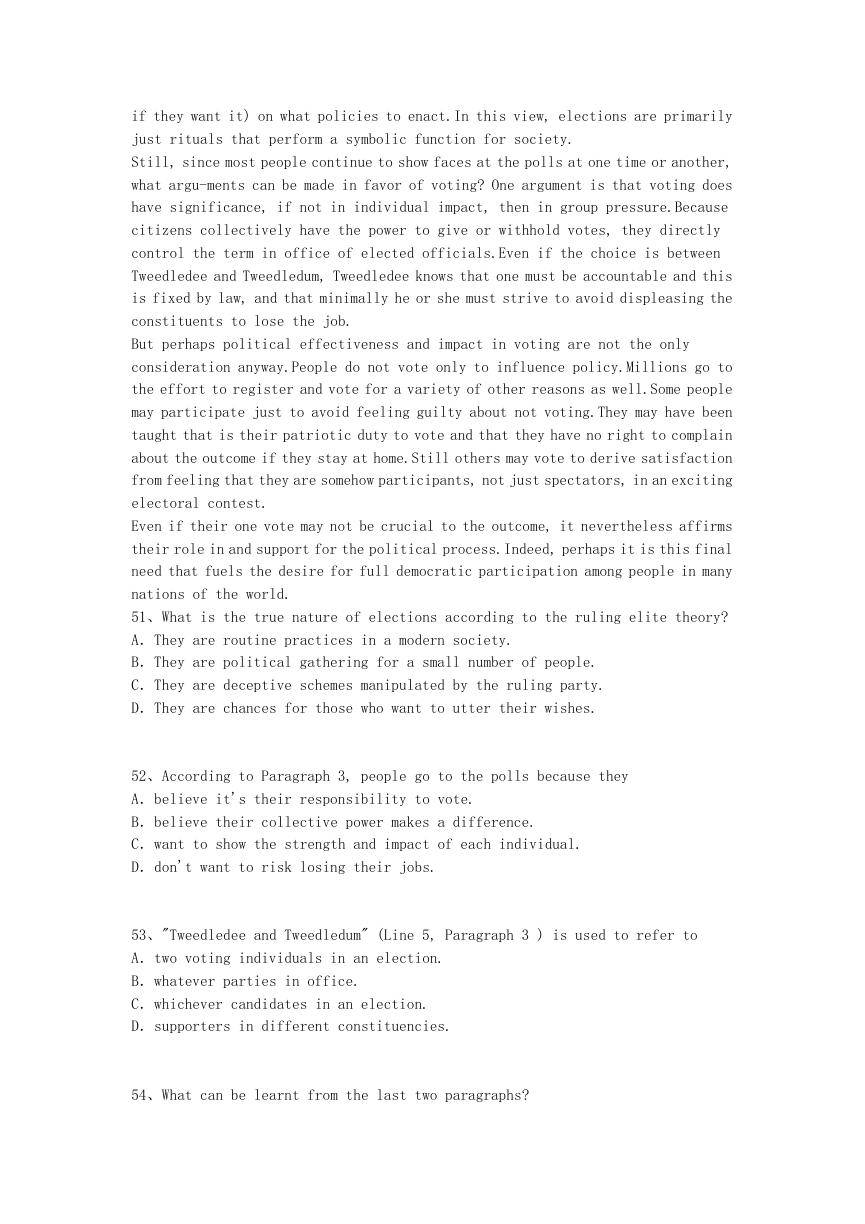








 2023年江西萍乡中考道德与法治真题及答案.doc
2023年江西萍乡中考道德与法治真题及答案.doc 2012年重庆南川中考生物真题及答案.doc
2012年重庆南川中考生物真题及答案.doc 2013年江西师范大学地理学综合及文艺理论基础考研真题.doc
2013年江西师范大学地理学综合及文艺理论基础考研真题.doc 2020年四川甘孜小升初语文真题及答案I卷.doc
2020年四川甘孜小升初语文真题及答案I卷.doc 2020年注册岩土工程师专业基础考试真题及答案.doc
2020年注册岩土工程师专业基础考试真题及答案.doc 2023-2024学年福建省厦门市九年级上学期数学月考试题及答案.doc
2023-2024学年福建省厦门市九年级上学期数学月考试题及答案.doc 2021-2022学年辽宁省沈阳市大东区九年级上学期语文期末试题及答案.doc
2021-2022学年辽宁省沈阳市大东区九年级上学期语文期末试题及答案.doc 2022-2023学年北京东城区初三第一学期物理期末试卷及答案.doc
2022-2023学年北京东城区初三第一学期物理期末试卷及答案.doc 2018上半年江西教师资格初中地理学科知识与教学能力真题及答案.doc
2018上半年江西教师资格初中地理学科知识与教学能力真题及答案.doc 2012年河北国家公务员申论考试真题及答案-省级.doc
2012年河北国家公务员申论考试真题及答案-省级.doc 2020-2021学年江苏省扬州市江都区邵樊片九年级上学期数学第一次质量检测试题及答案.doc
2020-2021学年江苏省扬州市江都区邵樊片九年级上学期数学第一次质量检测试题及答案.doc 2022下半年黑龙江教师资格证中学综合素质真题及答案.doc
2022下半年黑龙江教师资格证中学综合素质真题及答案.doc